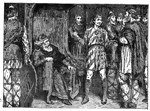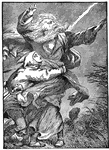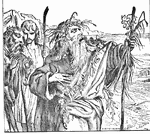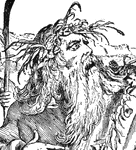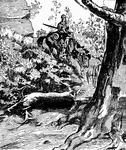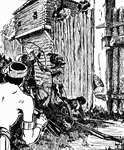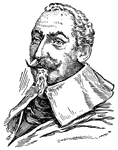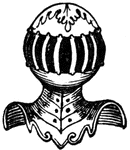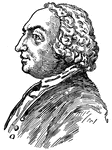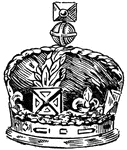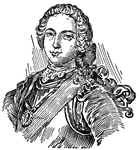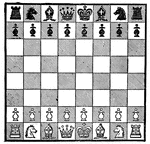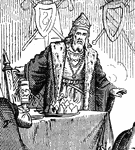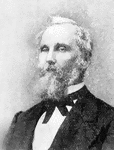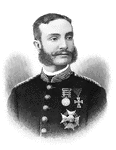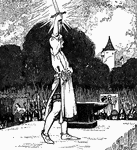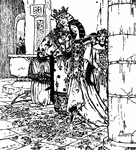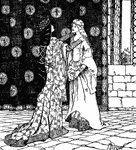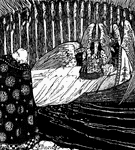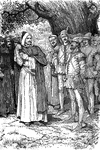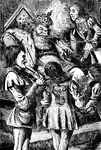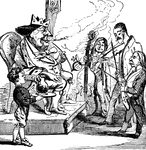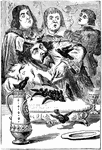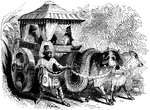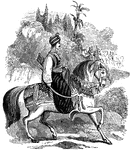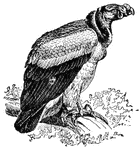
Vulture
In vultures, the head and neck are bare, the beak is long and curved at the tip, legs are powerful,…

Horseshoe Crab
Horseshoe crabs represent an order called Xiphosura, from the fact that the end of the abdomen is furnished…

King Bird of Paradise
Birds of Paradise are allied to the crows and found mainly in New Guinea. The king bird has beautiful…
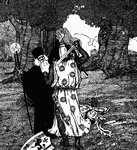
Merlin Saves Arthur
Arthur is about to be slain by the great Knight Pellinore but as he raises his sword against Arthur,…
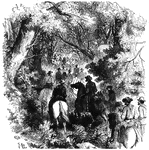
Laurel Hill
"Advance of General Rosecrans's division through the forests of Laurel Hill to attack the Confederate…
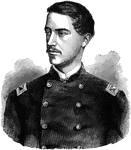
Ulric Dahlgren
"Colonel Ulric Dahlgren, born in Bucks County, Pa., in 1842, died near King and Queen's Courthouse,…

General David Hunter
"General Hunter, born in Washington, D. C., July 21st, 1802, died there, February 2nd, 1886, was graduated…
Kingfish
"King mackeral is also called kingfish. It is distinguished from other mackeral by weught, by its bluer…
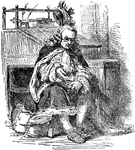
King in the Counting-House
Sing a Song of Sixpence. The king was in his counting-house, counting out his money.
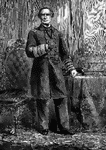
Admiral David G. Farragut
"Admiral Farragut, born at Campbell's Station, near Knoxville, Tenn., July 5th, 1801, died in Portsmouth,…

General Rufus King
"General King, born in New York city, January 26th, 1814, died there, October 13th, 1876, was graduated…
!["Presentation of colors to the Twentieth United States [African American] Infantry, Colonel Bartram, at the Union League Clubhouse, New York, March 5th, 1864. The Twentieth Regiment, United States [African American] Troops, left Riker's Island at nine o'clock on the 5th of March, 1864, on board the steamer <em>John Romer</em>, and were conveyed to the foot of Twenty-first Street, East River, New York, where they were disembarked and formed in regimental line, and marched to Union Square, arriving in front of the Union League Clubhouse at one o'clock. A vast crowd of citizens, of every shade of color and every phase of social and political life, filled the square and streets, and every door, window, veranda, tree and housetop that commanded a view of the scene was peopled with spectators. Over the entrance of the clubhouse was a large platform, ornamented with flags and filled with ladies. In the street was another platform, tastefully decorated and occupied by prominent citizens. From the stand the colors were presented by President King of Columbia College, who addressed them with warmth and eloquence. After the presentation ceremony was over the men stacked arms and partook of a collation provided for them."— Frank Leslie, 1896](https://etc.usf.edu/clipart/11700/11749/presentcolor_11749_mth.gif)
Presentation of Colors
"Presentation of colors to the Twentieth United States [African American] Infantry, Colonel Bartram,…

Red River
"The war on the Red River. Admiral Porter's fleet passing through Colonel Bailey's Dam, above Alexandria,…
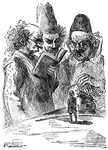
Scholars with Gulliver
After arriving at the King of Brobdingnag's court, Gulliver is analyzed by three of the King's scholars.
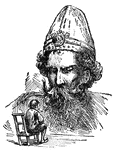
Gulliver and the King
Gulliver sitting in a chair, having a conversation with the King of Brobdingnag.
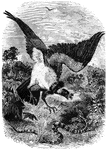
King Vulture
Genus sarcoramphus, a large vulture found in the tropical regions of the Americas, sometimes…

Funeral Cortege
"The funeral cortege, at boston, Mass., of the Sixth Massachusetts soldiers killed at Baltimore. The…

Fort Pulaski
"The bombardment of Fort Pulaski, second day, Friday, April 11th, 1862. General Quincy A. Gilmore took…
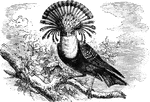
King Flycatcher
An impressive South American species of fly-catcher, with a transverse crest of reddish-fawn feathers.
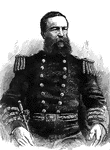
Admiral David Dixon Porter
"Admiral Porter, born in Chester, Delaware County, Pa., June 8th, 1813; died in Washington, D. C., February…
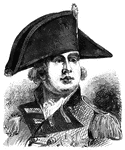
George III, King of England
"King George III, king of England during the old Confederation."—E. Benjamin Andrews, 1895

Benjamin Franklin
"Benjamin Franklin managed men, the whilom printer, king's postmaster-general for America, discoverer,…
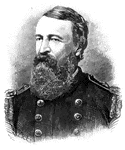
General David D. Porter
"General David D. Porter served during the Civil War."—E. Benjamin Andrews 1895

